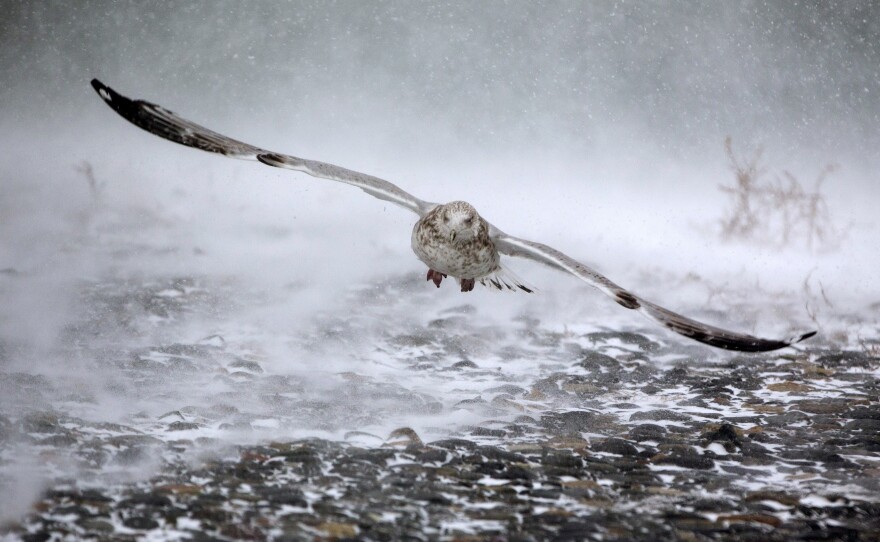Updated at 9:25 p.m. ET
A massive winter storm has brought hurricane-force winds, blizzard conditions and damaging coastal flooding to eastern New England, one day after it delivered unusual cold and snow to the South.
The National Weather Service says snow in the Northeast will end Thursday night, but it will be followed by strong winds and arctic air "resulting in dangerously cold wind chills" throughout the weekend.
Wind gusts of more than 70 mph were detected in some places in New England, according to The Associated Press. High winds are expected to increase the possibility of power outages.
"Blizzard to near-blizzard conditions will likely persist into the evening hours from eastern Massachusetts to Maine," the weather service says.

The storm has caused four deaths in North and South Carolina and another in Pennsylvania. Reuters reports the cold snap across much of the country has killed more than a dozen people.
Coastal Massachusetts is also experiencing "major and destructive" flooding, brought by a combination of high tide and waves from the storm, the Weather Service says. Some roads have become impassable.
Peter Kadzis of member station WBGH reported:
According to the National Weather Service in Boston, the city may have set a high-tide record, although it will need to be confirmed.
The Globe reports that some Boston train stations had to be shut down because of flooding, which affected multiple streets in the city's downtown. Large chunks of ice were seen on a downtown street.
But brutal winter weather is par for the course in Boston, and some residents are braving the elements, the AP writes:
The winter storm off the East coast has deepened ~24 millibars in a mere 7 hours. It is very rare for a storm to intensify so fast (usually 24 millibars in 24 hours is the standard for a rapidly intensifying storm). For all our friends out east...stay safe! pic.twitter.com/hgT7jmcA20
— NWS Marquette (@NWSMarquette) January 4, 2018
Here's a 24-hour @NOAA #GOES16 infrared loop showing the evolution of the deepening east coast cyclone. #blizzard pic.twitter.com/1jafoM9t30
— NASA SPoRT (@NASA_SPoRT) January 4, 2018
Meanwhile, NWS Boston advised residents, "We do not recommend going out and floating on icebergs; this is a very dangerous situation along the coastline with major flooding ongoing."
As the snow began tapering off, Weather Service officials tweeted warnings to residents to shovel snow safely, check batteries in carbon monoxide and fire detectors and clear snow and ice from vents outside of homes.
The "bomb cyclone" that bludgeoned New England is a powerful storm, bringing bitter cold and heavy snow.
The rate at which the storm has intensified is unusual — the Capital Weather Gang at The Washington Post called it "astonishing." A storm can be classified as a "bomb cyclone," or a particularly fast-forming storm, if the pressure drops 24 millibars in 24 hours. This storm has more than doubled that pace.
"This storm's pressure tanked 53 millibars in 21 hours (and 59 millibars in 24 hours), which puts it into the upper echelon of the most explosive East Coast storms ever observed — and perhaps even at the top," the Post writes.
The NWS in Boston calls this storm "impressive, explosive" and "high-impact."
Wondering about the shape of the #blizzard? The powerful midlatitude #BombCyclone has several meso-vortices spinning within its center, #GOESEast ABI captured these images of the storm every minute today. #snowday See more #cool GOES imagery here: https://t.co/mbgRYot60A pic.twitter.com/Zzab51uurp
— NOAA Satellites (@NOAASatellites) January 4, 2018
Thousands of flights have been canceled. Across the Northeast, schools are shuttered, salt has been spread, and local officials are pleading with residents to stay off the streets if they can.
There is near-zero visibility in some of the snow bands passing over the states from New Jersey to Maine, the weather service says.
Earlier in the day, NPR's Hansi Lo Wang reported that it wasn't just the ice and cold that authorities were worried about:
Member station WNYC reports that officials are urging New York City residents to remain indoors:
Copyright 2023 NPR. To see more, visit https://www.npr.org.













